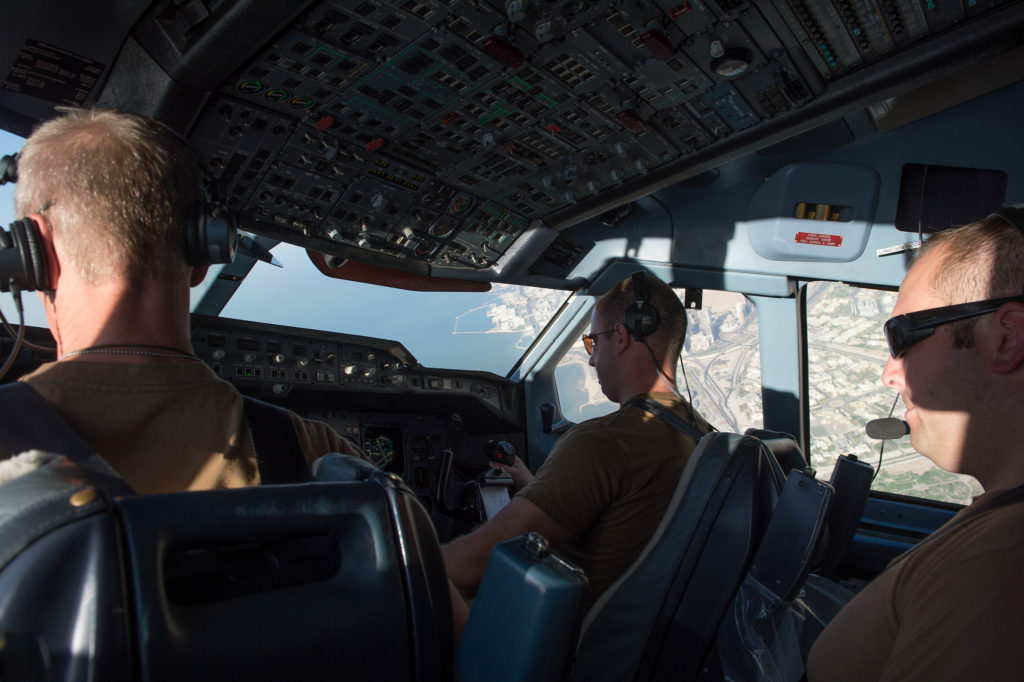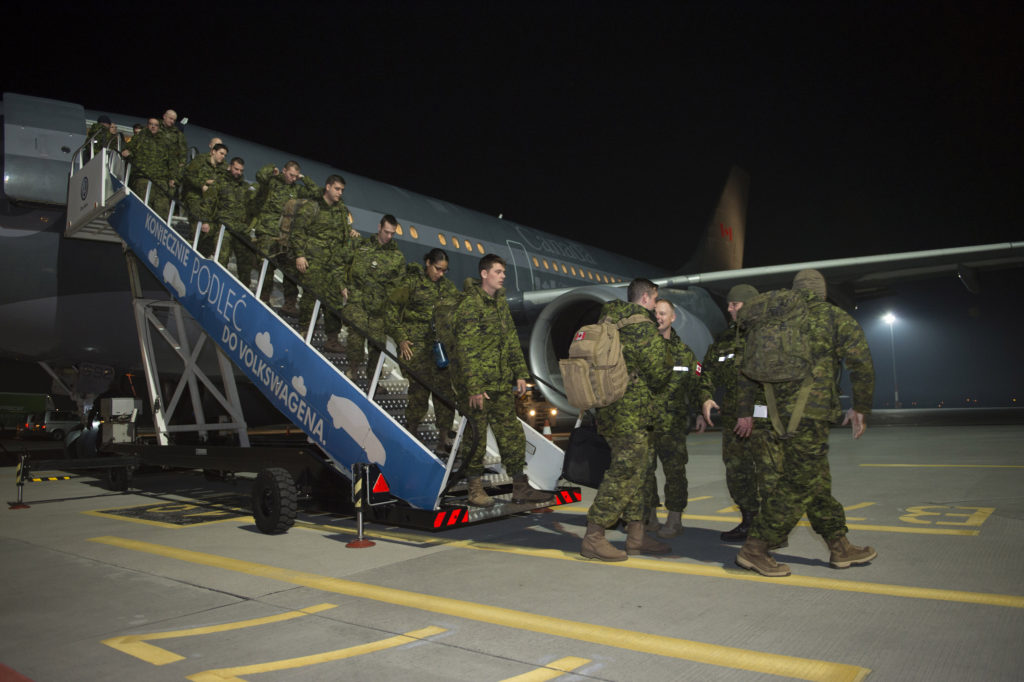Estimated reading time 7 minutes, 3 seconds.
LGen Al Meinzinger, commander of the Royal Canadian Air Force, contributed this guest column to the February/March issue of Skies:
In her December 2018/January 2019 Skies editorial, Lisa Gordon highlights the global pilot shortage and the need to retain our valuable personnel as the aviation industry experiences unprecedented and ongoing growth. As a result, she emphasizes, “the search for qualified employees will become increasingly intense.”

I would not limit these pressures to pilots, however. Air forces and the aviation industry are fortunate to employ highly-skilled, specialized tradespeople, but it comes at a significant investment of resources to develop these talented individuals. As Lisa points out, we must examine what we offer our people–not just in pay and benefits, but in all other aspects that affect their quality of life as members of our organizations.
The Royal Canadian Air Force (RCAF) faces additional challenges: We must grow our own personnel (it takes three to seven years to develop a pilot). We must retain our personnel, their skills and their experience–not only for mission success, but also so they can transfer their knowledge and expertise to more junior members. This ongoing knowledge transfer sustains us as an institution.
Historically, we have not had a shortage of pilot applicants and we are making great strides in increasing our technician numbers. Therefore, we are focusing specifically on enhancing the training, absorption, employment and retention of our personnel. Given our training timelines, however, it may take several years before our improvements bear fruit.
A number of Canadian Armed Forces-wide initiatives, such as increased capacity to train recruits, and an initiative to make it easier for our personnel and their families to move between provinces, will assist. We are working with the Recruiting Group to enrol skilled former Air Force members, as well as those from other allied nations, and enhance support to new applicants as they go through the recruiting process.
One of our greatest challenges is retention of experienced members; in particular, pilots. As Lisa points out, “In addition to money, what perks can you give pilots to keep them happy and firmly seated in the cockpits of your aircraft?”
Our research indicates some of the top occupation-related satisfiers for RCAF pilots are the opportunity to fly and the value and meaning of their work; the top two occupation-related dissatisfiers are workload and postings. Yet, we realize that all these factors come together when people make decisions about their future.
We pay our pilots at a higher rate than their non-specialist peers, but we will also examine compensation and benefits that may contribute to our retention efforts. Understanding that this takes time, we are placing great emphasis on what we can also do now to improve life in the RCAF.
It’s axiomatic that aircrew generally dislike “flying a desk.” We are therefore looking at longer flying tours (fewer postings), increasing opportunities to continue flying while working in staff jobs, and filling certain air-centric ground duties with personnel who are not aircrew, thereby returning those who fly to flying duties.

Improved training throughput will also ease workloads. In 2014, we established a new aircrew selection test and now have sufficient graduates of the entire process to determine if training success rates have improved. Anecdotally, this appears to be the case, and I look forward to the formal analysis.
A joint program with Seneca College is also reaping benefits. RCAF pilot candidates who attend Seneca are earning their wings at a higher success rate and graduating earlier compared to other programs.
In-house, we are ensuring the maximum availability of instructors during peak training periods. Our fighter squadrons also deploy to southern locations during periods of typically bad weather–winter. The squadrons are thus getting two or three times more flying time than could be accomplished in the same time span in Canada.
We are also improving the situation for our technicians. We increased our production of aircraft structures technicians through a contract with École nationale d’aérotechnique that provides candidates with most of the training offered by the Canadian Forces School of Aerospace Technology and Engineering.
For our Fighter Force technicians, we are contracting second-line maintenance, which will enable us to move 200 technicians to first-line squadrons. We are also bringing contractors, the majority of whom are retired members of the RCAF, to our first-line squadrons to mentor and support our younger and less-experienced technicians.
Meanwhile, we are working on attracting more applicants to the Reserve Force, developing an entry-level, part-time occupation to further augment and support air operations, and retaining more retiring Regular Force personnel, notably pilots, as members of the Reserve Force.
I could go on, but these are some of the major initiatives we are taking to improve the health of our pilot and maintainer occupations. Many others are ongoing or being assessed.
Clearly, we must constantly work to have the right people in the right positions with the right training to fulfil the mandate and tasks assigned to us by the government. I am confident that the many initiatives we have in the works will enhance the RCAF’s “bench strength,” while ensuring our fleets continue to provide valuable air power on behalf of Canadians and our allies.









This is not a problem unique to the RCAF. Allied Air Forces around the world are all struggling to retain their highly qualified pilots and maintainers; While other nations acknowledge and address the issue, the RCAF has stalled and debated the implementation of several “initiatives” to hopefully alleviate the problem.
Problem:
“top occupation-related satisfiers for RCAF pilots are the opportunity to fly and the value and meaning of their work; the top two occupation-related dissatisfiers are workload and postings”
2 main initiatives to address this issue:
1. Recruit more
2. Make it easier to move between provinces
Seriously?
Seems to me the problem is either not understood, or it is simply being ignored. Try looking at this from the perspective of those you are currently trying to retain. Let’s say I were an RCAF fighter pilot with a young family. My options at the end of a contract would be Cold Lake or Bagotville. At this point in my career, I will have already made tremendous sacrifices to serve, and I will have asked my family to make the same, if not greater, sacrifices. The RCAF would have me stay in Cold Lake, living in an isolated area, far from family and friends, where my spouse is unable to have a career of their own, and the winters are unforgiving (although that wouldn’t affect me as I would be too busy working and enjoying the southern US sunshine). What is the alternative? Well, there’s the east coast base in Bagotville. To move out there, I would have to sell the home in Cold Lake that I bought for a huge loss thanks to the energy/oil boom in that area, and oh by the way, there may be a minor language barrier as it is a french speaking community. So, unless my family is bilingual (unlikely in most cases) then it looks like I am out of luck.
I wonder what my workload would be like with the fact we are currently losing so many pilots and now have to train more to make up for the attrition. I am sure quality time with my family will now be at a premium with all the extra responsibilities and professional development I will have to make up for now that we are undermanned. I wonder if the high standards and credibility Canadian pilots have earned and maintained over the years are still intact or if we are now compromising safety and awarding qualifications prematurely just to boost numbers within the ranks.
And how will the RCAF reward me for sticking around despite all this? Well, they buy 18 obsolete aircraft being sold by a partner nation to augment our existing fleet of 40 year old relics that have not been upgraded for at least 10 years. How much job satisfaction and value would I have in flying obsolete aircraft that are most likely not deployable in any modern theatre of war due to the inherent risk they would pose?
It’s ok though, there are “initiatives” in place…I am no expert, but any company looking to retain talent and skill does so through pay and benefits. It may not be the solution for everyone, but it may stop the bleeding. For the life of me I cannot picture a single fighter pilot saying “I was going to go to the airlines, but now that I can get front of the line privileges at the DMV to change my provincial driver’s licence, I’ll reconsider”.
The criticisms stated by Harry are true.
But the root of the problem is a government that doesn’t want a real military. Trudeau pulled out our CF-18s from Afghanistan, saying “This isn’t Canada”. The he delays and kills the efforts to buy up to date fighters, like the F-35, that would be necessary for any meaningful contribution by Canada to fight world evil. Canadians join our military to fight for their country and contribute to a better future.
Why would any military family put up with the sacrifices of being shunted around every three years to the backwaters of Canada when our own government begrudges our military’s existence?